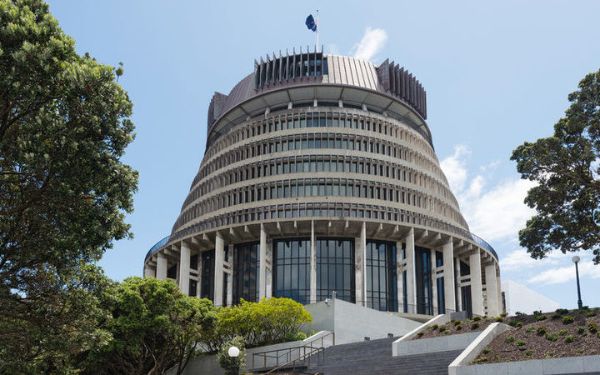Transparency International is warning the need to reform political funding structures is more urgent than ever - and that complacency is leaving the country more vulnerable to corruption.

The Serious Fraud Office's (SFO) scrutiny of donations to National and New Zealand First has sparked debate about whether there needs to be a deeper investigation into party funding and electoral laws.
Prime Minister Jacinda Ardern said she would review the issue if re-elected - but she was rejecting suggestions the recent scandals showed big money was influencing New Zealand politics.
Transparency International New Zealand chairperson Suzanne Snively said it was a risky time for political parties.
With membership numbers falling, so too were reliable funding sources.
"So they're going to be looking around for other sources and the other sources in a sense likely to be less reliable, less secure, more likely to want to have a quid pro quo," she said.
Snively said the concern was lawmakers might turn into lawbreakers in order for their party to survive.
Sitting MP Jami-Lee Ross and three Auckland businessmen face SFO charges relating to two donations of $100,000 to the National Party. All have pleaded not guilty.
The SFO is also investigating the New Zealand First Foundation's handling of donations.
National and New Zealand First both deny any wrongdoing.
Political commentator Bryce Edwards said vested interests in New Zealand politics were too big to ignore and said we needed a Royal Commission into electoral laws.
"We'd be wise to assume that what's been uncovered with the Serious Fraud Office is probably the tip of the iceberg, or at least it's typical of what goes on in a more widespread way," Edwards said.
"Certainly I think the ball is in the court of the politicians to prove otherwise."
The Opportunities Party leader Geoff Simmons said with the "wolves in charge of the hen house" only an independent review could be trusted.
"Just how widespread this problem is, on both sides of the parliament, this absolutely needs an independent look," Simmons said.
"And it seems like even if the letter of the law may or may not have been broken, it's incredibly clear that the spirit of the law has been broken."
Although Ardern promised to look at electoral finance laws if she was re-elected, she was inclined to have an in-house review through the normal select committee process.
Snively said that would make a strong statement.
"That would be the best evidence that our parliamentarians strive for integrity is to have a select committee process that was honest and open and which worked to move this forward quickly."
But given the spotlight on party donations in recent months, were there concerns that politicians were potentially being "bought off" by donors?
Greenpeace executive director Russel Norman, a former Green Party co-leader, didn't think the process was as crude as that.
"Political parties and MPs are more likely to give a decent hearing to people that are giving them very large sums of money," Norman said.
"I just think that's human nature, I mean even with the best of intentions, inevitably if someone's giving hundreds of thousands of dollars to a party then that party is going to listen."
Simmons said at this point, it didn't really matter whether the influence was real or not.
"The whole point of a democracy is that people need to have confidence in it, so even if things look a bit dodgy that's enough to warrant another look."
But Ardern doubted the public believed there was corruption in New Zealand politics.
"That is not the New Zealand politics, that is not the New Zealand democracy I know. So actually I do reject that, I reject that strongly.
"There's a reason New Zealand is number one in Transparency International's ranking in the way we conduct ourselves as a nation and I include politics in that."
But Snively said complacent trust in New Zealand's low-corruption reputation left us vulnerable, particularly to foreign actors.
"The size of the donations we're talking about are large amounts by New Zealand standards, but they are absolute pip-squeak in regards to the amount of money floating around the world looking for loose places.
"So we really think that people have got to wake up and be far less complacent."
Snively was hopeful scrutiny by the SFO would be that much-needed wake up call.
Whatever form a review took, it should be a priority, so any reforms were made in time for the 2023 election, she said.



 Richard S. Ehrlich: China's Great Wall & Egypt's Pyramids
Richard S. Ehrlich: China's Great Wall & Egypt's Pyramids Gordon Campbell: On Surviving Trump’s Trip To La La Land
Gordon Campbell: On Surviving Trump’s Trip To La La Land Ramzy Baroud: Famine In Gaza - Will We Continue To Watch As Gaza Starves To Death?
Ramzy Baroud: Famine In Gaza - Will We Continue To Watch As Gaza Starves To Death? Peter Dunne: Dunne's Weekly - A Government Backbencher's Lot Not Always A Happy One
Peter Dunne: Dunne's Weekly - A Government Backbencher's Lot Not Always A Happy One Richard S. Ehrlich: Cyber-Spying 'From Lhasa To London' & Tibet Flexing
Richard S. Ehrlich: Cyber-Spying 'From Lhasa To London' & Tibet Flexing Gordon Campbell: On Aussie Election Aftershocks And Life Lessons
Gordon Campbell: On Aussie Election Aftershocks And Life Lessons